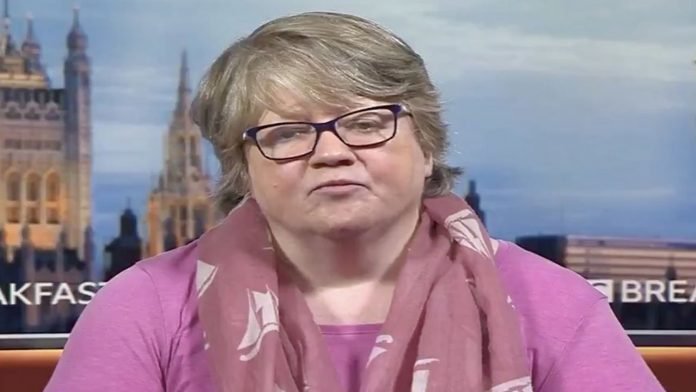The Tory welfare chief today confirmed she is “entirely happy” with cutting 6million people’s benefits by £20 a week.
Therese Coffey confirmed she was content with the huge cut to Universal Credit, which campaigners will plunge half a million Brits into poverty after it kicks in between October 13 and November 12.
People who lose £20 a week from their Universal Credit payments under Government plans could work extra hours to make up for the cut, Work and Pensions Secretary Therese Coffey has suggested.
The Cabinet minister on Monday defended the move to end the increase introduced in response to the coronavirus pandemic by saying it had always been “temporary”.
But there have been calls to keep the extra money in place amid concern that the plans will heap further pressure on struggling families.
The Work and Pensions Secretary was confronted in a TV interview with the startling impact of the plans, which a government memo reportedly warned will lead to a surge in homelessness and food banks.
Her predecessor Iain Duncan Smith pushed through the Tories’ austerity-era benefit cuts for years before quitting in protest at them.
But asked today “are you entirely happy with this?”, Ms Coffey told Sky News: “Yes. We made this decision earlier this year, the Chancellor announced it in the Budget.
She said the current £20-a-week uplift, which began in April 2020 due to Covid, was only a “temporary stopgap” – and is equal to just over two hours for an over-23 on the £8.91 minimum wage.
Based on individual claimants’ payment dates, around 6 million low-income families will lose £1,040 from their annual income. It would create serious financial hardship and leave 500,000 people to be swept into poverty – including 200,000 children.
The JRF states: Around 6 in 10 of all single-parent families will be affected by this, and despite the Government’s commitment to ‘levelling up’ the impact of the cut will be the greatest across the North of England, Wales, the West Midlands and Northern Ireland.
The planned cut to Universal Credit and Working Tax Credit in October:
- 140 constituencies would see more than one in four of all families (with or without children) affected, including 36 Conservative seats.
- According to this analysis, on average 21% of all working-age families (with or without children) in Great Britain will experience a £1,040-a-year cut to their incomes on 6 October.
- Over 400 constituencies are set to see over one in three working-age families with children hit by the cut.
This £20 a week is scheduled to be cut, coming into effect for families on Universal Credit from 6 October. This cut will impose the biggest overnight cut to the basic rate of social security since the foundation of the modern welfare state.
Politicians of all parties have warned against this cut and called for the investment to be made permanent, including Labour and SNP leadership, all six previous Secretaries of State for Work and Pensions since 2010, the Work and Pensions Committee, the Lords Economic Affairs Committee, the Conservative Northern Research Group and the Conservative One Nation Caucus.
UK Covid-19 business bailouts have already cost more than £100bn

Many people are now waiting with bated breath to see what measures the government will issue to claim back over £100billion in public money given in covid bailouts to big businesses and multinationals. Long wait…
In early 2020, the Government established three business loans schemes in response to the pandemic:
- the Coronavirus Business Interruption Loans Scheme (CBILS)
- the Coronavirus Larger Business Interruption Loans Scheme (CLBILS)
- the Bounce Back Loans Scheme (BBLS).
The schemes were part of the Government’s package to support the economy through the pandemic. Their launch received wide political and business support.
The British Business Bank oversaw the schemes. A range of accredited lenders made decisions on applications made to them.
By 31 May 2021, the three schemes disbursed over £79 billion through loans and similar facilities. BBLS accounted for over 93% of loans made and almost 60% of funds disbursed.
The government guarantee lenders they will cover defaults up to 100% and further simplified application processes. The scheme immediately proved to be particularly popular.
Many businesses have certainly survived with the help of the schemes. But many face an uncertain future. The Office for Budget Responsibility has suggested that up to 40% of BBLS borrowers may default. Given the Government guarantee, this could lead to losses of as much as £33.7 billion. Referenced, House of Commons Library.
Support Independent Journalism Today
Our unwavering dedication is to provide you with unbiased news, diverse perspectives, and insightful opinions. We're on a mission to ensure that those in positions of power are held accountable for their actions, but we can't do it alone. Labour Heartlands is primarily funded by me, Paul Knaggs, and by the generous contributions of readers like you. Your donations keep us going and help us uphold the principles of independent journalism. Join us in our quest for truth, transparency, and accountability – donate today and be a part of our mission!
Like everyone else, we're facing challenges, and we need your help to stay online and continue providing crucial journalism. Every contribution, no matter how small, goes a long way in helping us thrive. By becoming one of our donors, you become a vital part of our mission to uncover the truth and uphold the values of democracy.
While we maintain our independence from political affiliations, we stand united against corruption, injustice, and the erosion of free speech, truth, and democracy. We believe in the power of accurate information in a democracy, and we consider facts non-negotiable.
Your support, no matter the amount, can make a significant impact. Together, we can make a difference and continue our journey toward a more informed and just society.
Thank you for supporting Labour Heartlands












